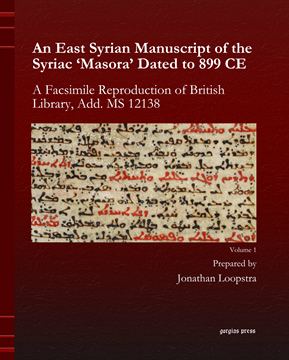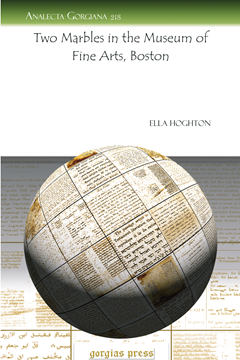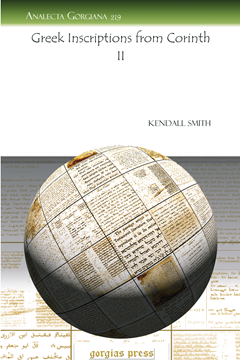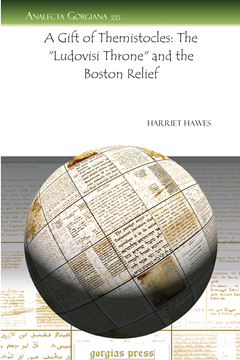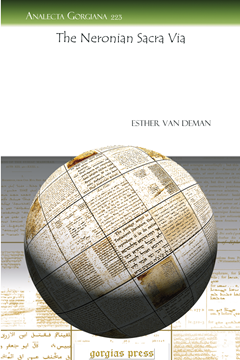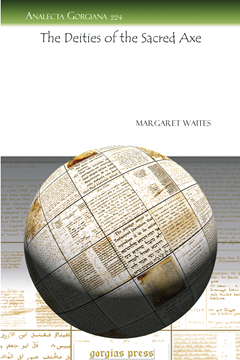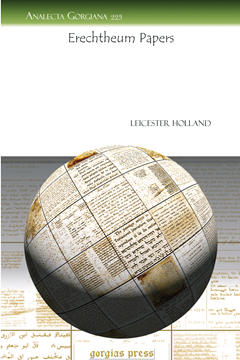An East Syrian Manuscript of the Syriac 'Masora' Dated to 899 CE (Volume 1)
A Facsimile Reproduction of British Library, Add. MS 12138
Prepared by Jonathan Loopstra
ISBN: 978-1-61143-896-3
This unique manuscript of the East Syrian Syriac ‘Masora’ is essential for any study of early Syriac vocalization, accentuation, and punctuation. This volume presents a facsimile reproduction of this ‘masoretic’ manuscript. An introduction and comprehensive scriptural indices will be included in a forthcoming volume.
$263.00 (USD)
Two Marbles in the Museum of Fine Arts, Boston
By Ella Hoghton
Series: Analecta Gorgiana 218
ISBN: 978-1-60724-447-9
In this paper Houghton addresses two problematic Italian Renaissance sculptures whose artists are unknown, the portrait bust of a youth and that of a Roman emperor.
$39.00 (USD)
Greek Inscriptions from Corinth II
Series: Analecta Gorgiana 219
ISBN: 978-1-60724-448-6
This paper presents the very few surviving inscriptions from this period before Mummius' sack of Corinth and includes some of the few Greek decrees known at the time of the writing of the paper.
$44.00 (USD)
The Theory of Gothic Architecture and the Effect of Shellfire at Rheims and Soissons
By Roger Gilman
Series: Analecta Gorgiana 220
ISBN: 978-1-60724-449-3
This paper reviews these competing theories of the definition of 'Gothic' and the way in which this style developed, presenting an overview of the difficulties involved in assigning a single name to a developing form of human expression
$38.00 (USD)
The "Ludovisi Throne" and the Boston Relief
Series: Analecta Gorgiana 221
ISBN: 978-1-60724-450-9
In this article Harriet Boyd Hawes, groundbreaking archaeologist, nurse, and relief worker, suggests that the reliefs are the adornments of a couch-altar that stood in the sanctuary which Themistocles restored for the Lycomids at Phlya..
$37.00 (USD)
Pilgrimage Sculpture
Series: Analecta Gorgiana 222
ISBN: 978-1-60724-451-6
Arthur Kingsley Porter here traces the roots of Renaissance sculpture to the smaller decorative sculptures found on the outside of churches and other buildings beginning around the turn of the first millennium A.D.
$42.00 (USD)
The Neronian Sacra Via
Series: Analecta Gorgiana 223
ISBN: 978-1-60724-452-3
Esther van Deman reconstructs the structure of the Neronian Via Sacra (one of the arterial roads leading through the Roman Forum), which was refurbished during his reign with colonnades.
$40.00 (USD)
The Deities of the Sacred Axe
Series: Analecta Gorgiana 224
ISBN: 978-1-60724-453-0
In this paper Margaret Waits offers an explanation for the pervasive and enigmatic symbol of the double-axe in Mycenaean culture with special reference to the religions of Greece and Asia Minor
$37.00 (USD)
Erechtheum Papers
Series: Analecta Gorgiana 225
ISBN: 978-1-60724-454-7
This series of papers presents a thorough and enlightening overview of the nature of the Erechtheion's remains, its history of renovation and destruction, and the purposes to which it may have been put.
$51.00 (USD)
Studies of the Exploits of Heracles on Vases
By Stephen Luce
Series: Analecta Gorgiana 226
ISBN: 978-1-60724-455-4
This paper discusses the tales of Heracles as told in vase-paintings, which often represent earlier or more popular versions of the stories than those preserved in upper-class literature.
$36.00 (USD)
